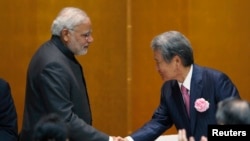India's Prime Minister Narendra Modi September 1 sought Japan's help for clean energy, skill development and announced setting up a special management team in his office to facilitate trade between the two countries.
Modi, on his first major foreign visit since a landslide election win in May, arrived on August 30 for a five-day trip aimed at capitalizing on a personal affinity with Japanese Prime Minister Shinzo Abe to bolster security and business ties in the face of an assertive China.
Addressing a joint session of India-Japan business leaders in Tokyo, Modi said he would appoint two officials in India's industrial team as per Japan's choice.
“I have decided to create a special Japan plus management team in the PMO (prime minister's office), which will be absolutely dedicated to facilitate Japan. As a result, facilities will increase,” he said.
India hopes to win Japanese backing for a nuclear energy pact during Modi's visit, and lure investment into its $85 billion market while addressing Japan's concern about doing business with a nuclear-armed country.
“We believe in environment-friendly development. It is very important for us that we get maximum cooperation from Japan in the field of clean energy. We can serve global needs,” added Modi.
Japanese Prime Minister Abe will tell Modi at a summit on Monday that Japan aims to double its direct investment in India in five years from some $2 billion last year, the Nikkei business daily reported.
The two leaders are also likely to agree to speed up talks on a nuclear energy pact, the Nikkei said, although hopes of striking a similar accord to one reached with the United States in 2008 had faded in the run-up to the visit.
The Indian prime minister also pitched for skill development in his country on the lines of Japan to meet the global requirements in 2020.
“We want to stress on skill development so that India can play a big role in meeting the global work force requirement in 2020. We want to focus on skill development on the lines of Japan whose hallmark is quality, zero defect, efficiency and discipline. We don't want any shortcoming in these issues,” added Modi.
Japan wants explicit guarantees from India, which has not signed the nuclear non-proliferation treaty, to limit atomic tests and allow closer inspection of its facilities to ensure that spent fuel is not used to make bombs.
Japanese firms also want clarity on nuclear disaster compensation, especially in the wake of the March 2011 Fukushima catastrophe.
Modi has listed manufacturing, infrastructure and energy as key areas for cooperation during his five-day visit. In his previous role as the chief minister of India's western Gujarat state, Modi had actively courted Japanese investment.
Also under discussion will be a proposal to formalize a 'two-plus-two' format for talks bringing together the foreign and defense ministers of both countries, and the possible sale of an amphibious aircraft to the India navy.
Modi, 63, is embarking on an intense month of diplomacy in which he will receive Chinese President Xi Jinping before meeting President Barack Obama in Washington as he seeks to carve out a stronger role for India as a global player.




